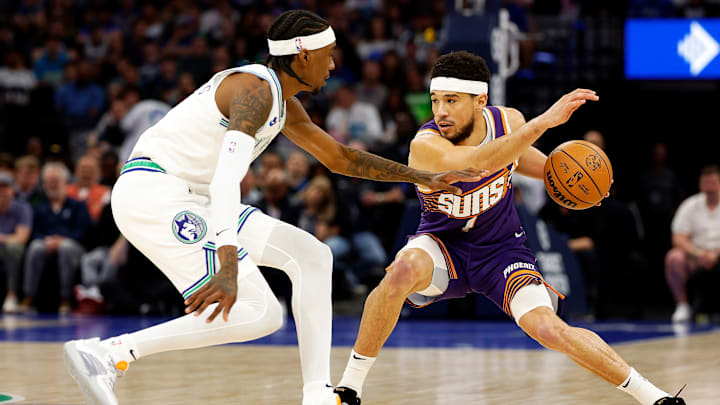On the final day of the NBA's regular season, hope turned to despair. While that may sound pessimistic, it's the truth. The Minnesota Timberwolves had just turned in the second-best regular season performance in franchise history—winning 56 games.
The Wolves haven't found this much success since Kevin Garnett led the squad to a 58-24 record in the 2003-04 season. That postseason, Minnesota earned the top seed and made it to the Western Conference Finals before falling 4-2 to the Kobe Bryant-Shaquille O'Neal-led Los Angeles Lakers.
This season, a 56-26 record earned the Wolves a third seed, behind fellow Northwest Division members, the Oklahoma City Thunder and Denver Nuggets. A third seed in the Western Conference is something to cheer about, especially with about half the teams winning 49-plus games.
Unfortunately for Minnesota, a third-seeding pairs the Wolves with the sixth-seeded Phoenix Suns. The Suns are winners of 49 contests this season and actually hold their worst seed of the decade. However, the Wolves are 0-3 this season against the Suns and lost yesterday 125-106.
Since 2021, Phoenix is 11-2 against Minnesota. This season, the Suns' average margin of victory was 15.6 points over the Wolves. A matchup against Phoenix is nightmare fuel for Minnesota. But what makes the Wolves so susceptible to the Suns?
In each game this season, the offense has performed inadequately, but the top-ranked defense hasn't fared much better. In the first affair, Minnesota went 5-of-27 from beyond the arc. The starters were abysmal, all registering negative plus-minuses.
While the offense was bad, the defense was horrendous. Minnesota allowed Phoenix to score 133 points and shoot 60.0 percent from the floor and 54.8 percent from deep. 133 points was the most allowed all season long. Superstars Kevin Durant and Devin Booker combined to score 62 points and cashed in on 23-of-37 attempts from the floor.
The Wolves' best wing defender, Jaden McDaniels, has spent time on both Booker and Durant this season. In eight-plus minutes defending Booker, he's allowed the Suns guard to score 14 points. However, he has forced Booker to shoot less than 50 percent from the floor.
Despite standing 6-foot-9, McDaniels defense against Durant has been subpar. The Suns forward is a generational scorer, but McDaniels has still done little to slow Durant. In six minutes spent being guarded by McDaniels this season, Durant has scored 14 points and gone 6-of-7 from the floor. Meanwhile, with the Wolves forward defending the NBA's eighth leading scorer, the Suns have totaled an eye-popping 53 points.
Although Durant has scorched McDaniels, Edwards isn't the best fit to cover Durant like he's been doing. The Suns' 6-foot-11 forward can easily pull up over the 6-foot-6 Edwards. In a seven-game series, McDaniels must be the primary defender.
In part two of the Wolves-Suns series, Minnesota only mustered 87 points—their lowest output of the season. Of course, Karl-Anthony Towns was on the shelf nursing his left knee injury, but that's no excuse for scoring less than 100.
The Wolves shot poor percentages overall, but self-inflicted wounds ultimately doomed Minnesota. Despite taking care of the ball much better over the last month, they turned it over 19 times in this battle against Phoenix. The starters once again got torched by the Suns' opening lineup, all registering negative plus-minuses.
Yesterday's shortcomings were a combination of the first two matchups. The Suns got everything they wanted offensively, while the Wolves turned it over at an alarming rate. Pheonix shot 54.7 percent from the field and 55.2 percent from beyond the arc.
The drop coverage played on Booker, Durant, and Bradley Beal proved to be troublesome. Although it's not a widely-used shot in today's NBA, the Suns' triumvirate excels at scoring in the mid-range. Whenever a pick was set on one of the star trio's defenders, Gobert would give cushion as the player came off the pick, allowing for an open jumper.
In this series, expect Gobert to hedge harder than normal, allowing Edwards, McDaniels, or whoever's the primary defender more time to get back in front of the Suns' initiator. A double can also be used on the pick-and-roll handler. However, this strategy may be used with caution as giving up an open Grayson Allen 3-pointer is a death sentence.
To remedy Minnesota's defensive flaws, look for more Kyle Anderson minutes. The Wolves forward is far more versatile than any of Minnesota's bigs. Towns and Gobert may be the second and third-best players, but having both on the court doesn't make for good matchups against the Suns.
On offense, it's up to Edwards to be more aggressive. This season, against the Suns, he's averaged just 15.0 points per game and shot a ghastly 28.6 percent from the floor. The Wolves star has shown a lack of aggression, despite being defended by an average defender in Beal.
There's no fix-all for the porous defense or the mistake-prone, efficient offense. Nonetheless, there are several things Minnesota must do to have a shot at advancing to the second round. Limit turnovers, prioritizing an Edwards-led offense, and finding the correct matchups for the Suns' star trio are all of the essence for Chris Finch and the coaching staff.
